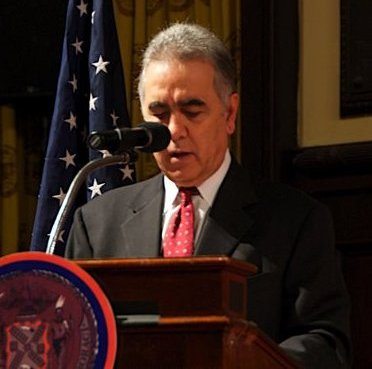Thecaliforniacourier.com
Turkish Prime Minister Erdogan’s statement on the ‘events of 1915’ released in nine languages last week was a major propaganda coup for Turkey, generating worldwide publicity. The announcement was so cleverly crafted that it fooled many in the international community — and regrettably, some Armenians — into believing that he came close to recognizing the Armenian Genocide or at least took ‘an historic’ step in the right direction.
In reality, Erdogan’s statement was nothing more than rephrased denial or old wine in a new bottle. Carefully avoiding the term ‘Armenian Genocide,” he conveniently borrowed Foreign Minister Ahmet Davutoglu’s deceptive terminology of ‘shared pain’ and ‘just memory,’ words that sound conciliatory, but actually equate the murderers with the victims. The Turkish Prime Minister’s reference to millions of Turks and others who also died during World War I is an insult to the memory of the 1.5 million victims of the Armenian Genocide. Millions of Germans also perished in World War II, but no one in their right mind and good conscience would equate their deaths with the extermination of six million Jews!
Erdogan’s call for a “joint historical commission to study the events of 1915” is another worn out and shrewd delay tactic. If Turkish officials are sincere in wanting to learn the facts of the Armenian Genocide, all they have to do is review the extensive documentation available in their own archives as well as studies conducted by countless historians and genocide scholars around the world. Why did the Turkish government wait for almost 100 years to show an interest in researching this topic? Why are some of the most sensitive Ottoman archives still kept under lock and key, not to mention those that were shredded long ago?
I have written many times for several years that:
1) Despite Turkish denials, the Armenian Genocide is a recognized fact by the international community and there is no need to wait for Pres. Obama, Prime Minister Erdogan or anyone else to acknowledge it.
2) Genocide recognition cannot right the wrongs committed by uprooting and decimating the Armenian people. A more appropriate objective would be to seek justice through legal channels, demanding restitution, both financial and territorial.
3) The Turkish offer for ‘reconciliation’ is nothing but a sinister ploy to bury the past with a meaningless acknowledgment and apology. True reconciliation is achieved by undoing the enormous damage inflicted on the Armenian nation.
It is imperative that Armenians remain vigilant and not be deceived by fake Turkish offers of reconciliation. Between now and April 24, 2015, the Turkish government will probably announce many more publicity stunts to win over the sympathy of the international community and minimize the damage to Turkey’s already tarnished reputation by accusations of genocide.
One such Turkish plan is Davutoglu’s cynical statement that the Armenian Diaspora is also Turkey’s Diaspora! There have been media reports that the Turkish government is preparing to grant citizenship to the descendants of former Ottoman subjects, including Armenians. Surprisingly, some naïve Armenians are fooled into thinking that this is a positive step! Just imagine settling in one of the towns of Turkish-occupied Western Armenia or Cilicia as a citizen of Turkey, and having your sons drafted into the Turkish military to ‘defend the Turkish nation’ and take part in the invasion of Kessab or Aleppo or even Armenia! How about being jailed, under article 301 of the Turkish Penal Code, because you made the mistake of speaking about the Armenian Genocide to one of your Turkish neighbors!
Erdogan’s real intent in issuing his April 23, 2014 statement is to undermine the worldwide Armenian efforts to seek justice as they prepare for the Centennial of the Armenian Genocide.
The fact that the State Department and some European officials reacted positively to Erdogan’s statement is an indication that this was a coordinated attempt to provide cover for the Obama administration and European countries not to deal with the Armenian demands on the genocide issue, using the excuse that Turkey’s leaders are in the process of reconciling with Armenians.
Armenians should resist the pressures by third parties to abandon the pursuit of their historic claims. The views of the US government or the EU on Armenian demands from Turkey should be irrelevant. Armenians should be the masters of their own fate and not allow other nations to dictate what is acceptable or unacceptable to them in the pursuit of their national interest.


